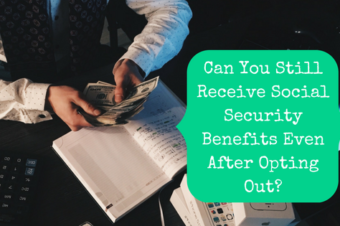
From time to time I read Thom Rainer’s blog to stay up to date on the issues that pastors are facing today. The most enlightening part is the comments that pastors leave on his articles. When I read the comments on his financial posts, my heart breaks.
There are so many challenges that pastors face that it makes me want to round you all up, give you big hugs, big thanks, a check for a million dollars, and a free week-long vacation on a private island with your spouse or family. And then go to your congregation and give some of the people a talking to.
But I can’t really do that, so I’ve chosen just one area, personal finance, where I feel I can actually make a positive impact on your lives. That’s why this blog exists.
What Pastors Regret Most About Their Personal Finances
In reading the comments on his articles and hearing from my own Pastor’s Wallet readers, it’s glaringly obvious that there is one financial area where most pastors end up with regrets. The older pastors are saying, “I wish I had listened when they told me…” and the young pastors are saying, “It’s just too hard right now…”
Can you guess what it is?
Saving for retirement. Like Americans in general, many pastors are saving nothing for retirement. Especially the younger ones. Unlike most Americans, a lot of these pastors won’t even have Social Security to fall back on in their old age because they have opted out.
Why You Need To Save For Retirement
Now, I know that some of you just aren’t planning on retiring. However, that might not be an option for you. If you don’t agree, follow that link and read the article.
Yes, you can pastor people and preach well into your 80s. But only if you’re sane and healthy. What happens if you get Alzheimer’s? Do you think you’ll still be pastoring then? Or what if you get cancer? My church’s senior pastor had to take a year off to fight cancer. I watched my dad do it, and believe me, you can’t just “keep working.”
Another common excuse I hear among Christians in general for not preparing for the future is “the Lord will take care of me.” Yes, the Lord will take care of you. He is taking care of you now, he gave you a job and tax-advantaged opportunities to save for retirement. He also gave you the Bible as a guidebook for life.
You know what the Bible says?
Go to the ant, you sluggard;
consider its ways and be wise!
It has no commander,
no overseer or ruler,
yet it stores its provisions in summer
and gathers its food at harvest. (Proverbs 6:6-8, NIV)
Several verses later it goes on to say that if you don’t heed this warning, “poverty will come on you like a thief and scarcity like an armed man.” (verse 11) In times of plenty, you are supposed to prepare for times of scarcity. Joseph understood that and we all know the incredible results of his wisdom.
You are working now. You need to prepare for times of scarcity, like when you cannot work any longer. God is providing now for your future needs. Don’t waste the opportunity that he has given you.
The Value Of Starting Young
When you’re young, you think of old age as being a lifetime away. Because, well, it pretty much is. But that makes it hard to think of the necessity of saving for retirement in concrete terms. It’s just not very real to you when you’re in your 20s.
However, that’s the most important time to be thinking about it. Why? Compounding interest. If you aren’t familiar with it, follow that link and read the article. When it comes to saving, compound interest makes time your most valuable asset.
If you start to save $20 a month when you are 25 and it grows at a rate of 8% until you are 65, you will end up with $69,820.

If you wait until you are 45 to do the same, you will end up with $11,780. Your total contributions are half what they would have been if you had started younger but your growth is only 12% of what it would have been.

To start at age 45 and get the same results as the 25-year-old putting away $20, you would have to save over $118 a month! You see why it’s so valuable to start saving early?
It’s Never Too Late To Start Saving For Retirement
That’s all fine and dandy, Amy, but it’s a little too late for me to start saving young. Is there any hope?
Yes! If you’re getting on in years and haven’t been saving much, you may find this article pretty depressing so far. Cheer up! While you may have missed out on some opportunities, it’s never too late to start saving. Even if you’re 50-years-old, if you start saving $350 a month and don’t retire until age 70 you’ll have over $200,000 to live off of with an 8% rate of growth.
The good news is that pastors usually don’t need as much saved for retirement as some other people. Why? You’re used to living on less.
The two major factors in retirement planning are how much you’ve saved and how much you spend. Some people have such a lifestyle where even having $5 million in savings won’t be enough.
Even if it’s too late for you to save a lot for retirement, you can develop a lifestyle that will not require a lot in retirement. And that can be just as powerful.
How Do You Start Saving For Retirement?
While you may be convinced of the importance of saving for retirement, that doesn’t mean you have any clue what to do about it. It’s okay, I was in the same boat. Until I sat down with a financial advisor, I had no idea what to do with money beyond my Bank of America savings account. And I wasn’t going to get very far with my savings with that 0.04% interest rate.
That 1½ hours with a financial advisor completely changed the trajectory of my family’s finances and I know its impact will be felt for multiple generations. While I’m a proponent of working with a financial advisor on a regular basis, I understand that it simply isn’t feasible for many people. However, I know from personal experience that even just an hour can be life-changing.
Because of this, I would encourage every one of you to do just that: sit down with a financial advisor for an hour or two so that he or she can get you on the right track for retirement.
If you don’t know a trusted financial advisor, my friend Ben Wacek of Guide Financial Planning is a Certified Financial Planner™ and Certified Kingdom Advisor® who works with pastors on a regular basis, mostly via video calls. He offers Quick Start Sessions where he will sit down with you for one to two hours and answer any questions you have and help you figure out a plan for your finances. You’ll also get a written summary of your meeting that clearly outlines the next steps you need to take, all for $500. You can schedule a Quick Start Session directly on his calendar using this link. He’s even agreed to offer a $50 discount to anyone who books before February 29, 2020 and mentions Pastor’s Wallet.
Five hundred dollars is a lot, but I am fully convinced that it will be more than worth it for you. If you don’t have an extra $500, go talk to one of the businessmen or businesswomen in your congregation. Tell them that you want to meet with a financial advisor (who won’t be selling you any products) in order to be a better steward of your finances and ask them to foot the bill. I’d love it if my pastor asked me that and I’d bend over backward to make it possible. (This is a good test to see if my pastor reads this blog!)
Full Disclosure: I do work with Ben on a part-time basis but receive no commission or monetary benefit if you choose to work with him. My only incentive is to help you make the most of the money God has entrusted to you.
If you won’t meet with a financial professional, at least open up an IRA and start putting some money into it. Make sure the money is invested so that it can grow. If you’re not interested in learning all about investments, just stick it in the Target Date Fund where the year is closest to your anticipated retirement. Then set up automatic contributions from your bank account. Even if that’s all you do, you’re heading in the right direction and ahead of a lot of your peers.




1 Response